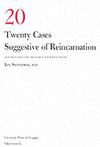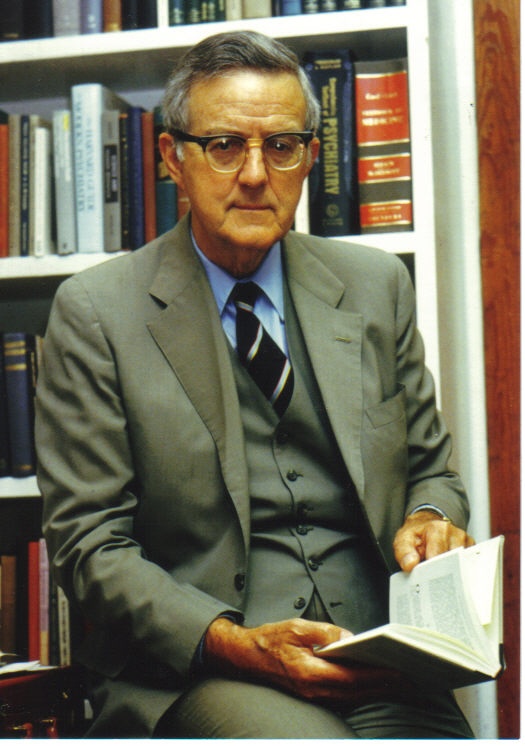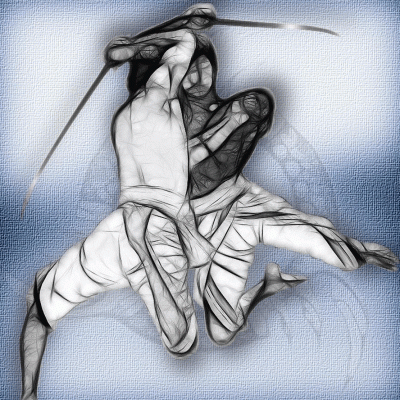The homepage of the Univ. of Virginia’s Division Of Perceptual Studies quotes Thomas Jefferson:
I was bold in the pursuit of knowledge, never fearing to follow truth and reason to whatever results they led.
It is a fine quote, exactly the sort of postprandial statement one can imagine Jefferson making at Monticello, with a glass of Chateau d’Yquem in one hand and Sally in the other. They don’t make presidents like him anymore.
But perhaps they do. That is, if Dr. Ian Stevenson is right.
Ian Stevenson‘s a medical doctor (internal medicine) trained at McGill University, the author of many peer-reviewed articles, and a former chaired professor at UVa. Dr. Stevenson’s pursuit of the truth has led him into very odd territory. In the 60s through the 80s, he investigated cases in India, Ceylon, Brazil, Alaska, and Lebanon that were “suggestive of reincarnation.”
Dr. Stevenson’s pursuit of the truth has led him into very odd territory. In the 60s through the 80s, he investigated cases in India, Ceylon, Brazil, Alaska, and Lebanon that were “suggestive of reincarnation.”
There’s a rough pattern to these reincarnation stories. A child– usually between two and four years of age — begins to claim that he/she is actually so-and-so, now deceased. Parents resist said claims. Eventually, contact with so-and-so’s family is made. Dénouement follows. At some point, ranging from 3 weeks to twenty years, Stevenson shows up with his tape recorder and interpreter. He interviews the families, cross-checks claims, classifies events into a typology, and then re-conducts the interviews with a second translator. The book describes twenty representative cases. His conclusion:
In the cases of the present collection we have evidence of the occurrence of patterns which the present personality is not known to have inherited or acquired after birth in the present life. And in some instances these patterns match corresponding and specific features of an identified deceased personality. In such cases we have then in principle, I believe, some evidence for human survival of physical death. I say in principle, because I continue aware [sic] of particular weaknesses in the present cases.
In short, there are events suggestive of reincarnation. Whatever one might think of his extraordinary conclusion, the book will induce respect. His case reports are painfully detailed, monumentally tedious and reassuringly detached. It’s shoe-leather research rather than arm-chair research. It’s Masters and Johnson sans lubrication. The book is a lovely testament to what empiricism is all about.
Assuming the evidence is not manufactured out of whole cloth (in which case the book ranks with great literature), there’s a neat little puzzle to be explained. Some of the cases are rather disquieting, especially the cases of Pramod and Swarnalata. Stevenson’s methodology is not that of the doctor or the physicist but that of the detective.
My skepticism about his conclusion has to do with a dog that does not bark. Seven of the cases are from India, three from Ceylon, two from Brazil, seven from Alaska and one from Lebanon. There’s none from Europe. None from North America. None from Canada. None from Australia. None from a family or culture that did not believe in reincarnation. The child from Lebanon, for example, was from a Druze family, the one group of people in the Middle East who happen to believe in reincarnation. Stevenson suggests that this lack of a bark is because of negligent reporting; if parents are from cultures that don’t believe in reincarnation, then they’d be much less receptive, even hostile, to their child’s claims about being reincarnated. As it is, parents are rarely amused when their children wish to adopt other parents.
It’s possible, of course, to cast doubt on Stevenson’s work by questioning his methodology, the possible collusion of families, the
easy manipulation of children and so on. The late philosopher, Paul Edwards, has written a fine book doing just that. Ostensibly, reincarnation is a silly idea; it’s not hard to make fun of it. And it doesn’t help that Stevenson works at a place called the "Division of Perceptual Studies" or DoP(e)S. The skepticism is more than justified. Paranormal studies is the open sewer of science; the carrier of daft ideas and willful deceptions.
Strictly speaking, reincarnation is about the persistence of memories after death; soul migration is a folk-theory invented to explain reincarnation. A scientific theory of reincarnation– if it exists — wouldn’t have to explain souls. A scientific theory of reincarnation would be a theory about human memory. We need a different kind of ghost, something with measurable properties. Perhaps the recent quantum mechanical basis claimed for consciousness may provide some clues.
It’s interesting to see what happens to a scientist who undertakes a field of inquiry that has zero scientific credibility. His book’s had few serious rebuttals. It’s mostly been ignored. In his interviews, Dr. Stevenson, who’s now in his 80s, sounds resigned to the benign neglect. Perhaps not so benign. A few years back, University of Virginia alumni tried to shut down the DoPS, claiming it damaged the reputation of the Psychology Dept. Fortunately, they failed.
My guide in these matters is William James. In a letter to Carl Stumpf dated Jan 1, 1886, he wrote:
It is a field in which the sources of deception are extremely numerous. But I believe there is no source of deception in the investigation of nature which can compare with a fixed belief that certain kinds of phenomenon are impossible.
Hear, hear.




Neat piece A and liked your observation on the dog that don’t woof. As always my guide in these matters is Saki.
In Reginald’s peace poem, there is this.
“….
‘When the widgeon westward winging
Heard the folk Vereeniginging,
Heard the shouting and the singing’
“but why widgeon?”
“Why not? Anything that winged westward would naturally begin with a W.”
“Need it wing westward?”
“The bird must go somewhere. You wouldn’t have it hang around and look foolish.”
—————
Substitute soul for bird and there you are.
V
Would not the beleif in recarnation fall into the same catagory as beleif in the Bible, Koran ,Tanaka Vedas and other forms of religious beleifs people have without real scientific proof as one cannot use scientific experiments to prove them?
Roy: I agree that theories of reincarnation involving, say, soul migration and karma are not scientific. In that sense, it falls into the same category as other unverifiable beliefs. But if reincarnation is phrased in terms of physical mechanisms for how memory could persist after death, then there may be scientific approaches. Of course, this assumes there’s something to study. At the moment, we only have Stevenson’s data.
“My skepticism about his conclusion has to do with a dog that does not bark. Seven of the cases are from India, three from Ceylon, two from Brazil, seven from Alaska and one from Lebanon. There’s none from Europe. None from North America. None from Canada. None from Australia. None from a family or culture that did not believe in reincarnation. The child from Lebanon, for example, was from a Druze family, the one group of people in the Middle East who happen to believe in reincarnation.”
Your skepticism is wishy washy to say the least. In the same way you stated “The child from Lebanon, for example, was from a Druze family, the one group of people in the Middle East who happen to believe in reincarnation.”
Easily turned around People in the West or Europe, who don’t happen to believe in reincarnation, did not result in any reported cases.
Our children (here in the west) are taught from a very early age, to ignore these things as “myth” or folk tales. This more than explains the lack of reported cases. Parents enjoy guardianship over their own children and the inside of a psyche ward ain’t so pretty, you’ll find people will say pretty much anything you want them to with threats like that. I do not feel you’ve presented a valid argument, or better said an argument more acceptable than the author of this book.
Ref: I’m Watching’s comments
Fair enough. Cultural pressure could be suppressing reincarnation reports in the West. I think that’s Dr. S’s position as well.
I would imagine no parent wants to hear his/her child claiming to be part of someone else’s family. Dr. Stevenson describes the efforts taken to dissuade children from such claims even in societies that believe in reincarnation. Nevertheless, a few interesting cases did manage to percolate through. Given the population in the “West”, the lack of even a single case is telling, isn’t it?
Thanks for the comments.
Simply a telling sign of my early comment I think. Perhaps openly people will not discuss, however I have heard stories from parents on a more private note. Again I guess it comes around to how one was raised and what is considered open for discussion in a culture.
I haven’t read the book yet but, maybe I’ll take a look. Then be in a position to comment.
Have a good one!
Please see the news coverage about the American kid, James Leininger, who remembered being a WWII pilot. It's Stevenson all over again in the US and A. Hard to dispute.
Yes, that was a compelling ABC special. There's a reasonable refutation here: http://skeptico.blogs.com/skeptico/2005/07/reinca…
This phenomenon again turned up in social circumstances open to the possibility of reincarnation (the kid's grandmother, the parents, the therapist Carol Bowman). Kids are very suggestible, and it is impossible to know how many of James' memories were planted by the therapist.
I'm going by Hume's rule here: incredible claims should require incredible standards of evidence. Considering what is entailed by reincarnation, should it exist, I think it's reasonable to ask for much more rigorous evidence.
Thanks for visiting, Larry.